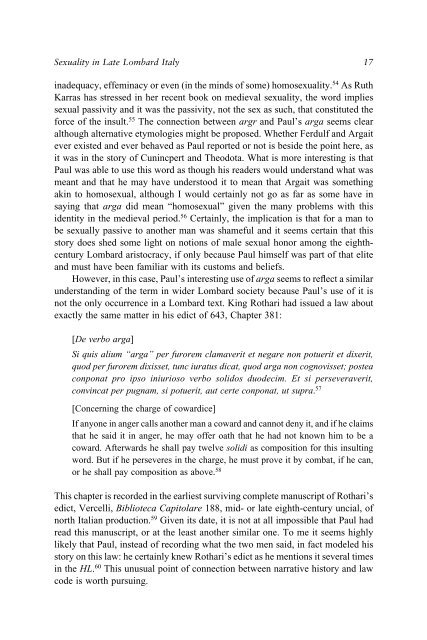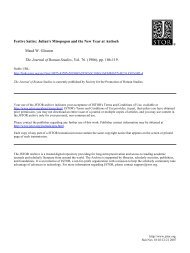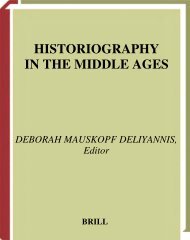Medieval Sexuality: A Casebook - Julian Emperor
Medieval Sexuality: A Casebook - Julian Emperor
Medieval Sexuality: A Casebook - Julian Emperor
Create successful ePaper yourself
Turn your PDF publications into a flip-book with our unique Google optimized e-Paper software.
<strong>Sexuality</strong> in Late Lombard Italy 1711112342225672228910111232224567892022212345678930111123435678940111123222inadequacy, effeminacy or even (in the minds of some) homosexuality. 54 As RuthKarras has stressed in her recent book on medieval sexuality, the word impliessexual passivity and it was the passivity, not the sex as such, that constituted theforce of the insult. 55 The connection between argr and Paul’s arga seems clearalthough alternative etymologies might be proposed. Whether Ferdulf and Argaitever existed and ever behaved as Paul reported or not is beside the point here, asit was in the story of Cunincpert and Theodota. What is more interesting is thatPaul was able to use this word as though his readers would understand what wasmeant and that he may have understood it to mean that Argait was somethingakin to homosexual, although I would certainly not go as far as some have insaying that arga did mean “homosexual” given the many problems with thisidentity in the medieval period. 56 Certainly, the implication is that for a man tobe sexually passive to another man was shameful and it seems certain that thisstory does shed some light on notions of male sexual honor among the eighthcenturyLombard aristocracy, if only because Paul himself was part of that eliteand must have been familiar with its customs and beliefs.However, in this case, Paul’s interesting use of arga seems to reflect a similarunderstanding of the term in wider Lombard society because Paul’s use of it isnot the only occurrence in a Lombard text. King Rothari had issued a law aboutexactly the same matter in his edict of 643, Chapter 381:[De verbo arga]Si quis alium “arga” per furorem clamaverit et negare non potuerit et dixerit,quod per furorem dixisset, tunc iuratus dicat, quod arga non cognovisset; posteaconponat pro ipso iniurioso verbo solidos duodecim. Et si perseveraverit,convincat per pugnam, si potuerit, aut certe conponat, ut supra. 57[Concerning the charge of cowardice]If anyone in anger calls another man a coward and cannot deny it, and if he claimsthat he said it in anger, he may offer oath that he had not known him to be acoward. Afterwards he shall pay twelve solidi as composition for this insultingword. But if he perseveres in the charge, he must prove it by combat, if he can,or he shall pay composition as above. 58This chapter is recorded in the earliest surviving complete manuscript of Rothari’sedict, Vercelli, Biblioteca Capitolare 188, mid- or late eighth-century uncial, ofnorth Italian production. 59 Given its date, it is not at all impossible that Paul hadread this manuscript, or at the least another similar one. To me it seems highlylikely that Paul, instead of recording what the two men said, in fact modeled hisstory on this law: he certainly knew Rothari’s edict as he mentions it several timesin the HL. 60 This unusual point of connection between narrative history and lawcode is worth pursuing.













